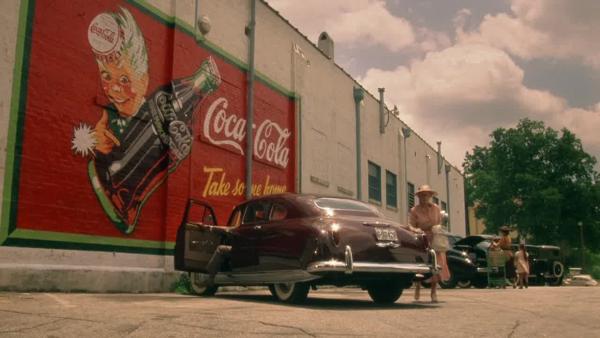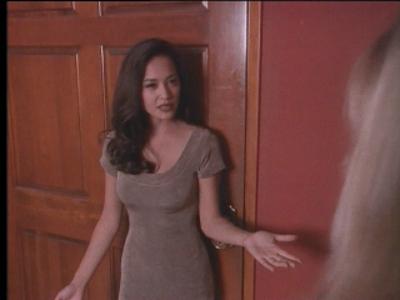Driving Miss Daisy Towards the Meaning of Life

1989![]()
Written by Alfred Uhry
Directed by Bruce Beresford

Throughout history one question has torn through mankind like a knife through butter. “Why are we here?” It seems a simple question that should easily be answered. But the answers do not come easily. Theories abound, all sorts of proofs exist, millions of people have spent countless hours and resources in search of the answer to this ultimate question. For many, they never find the answer they are looking for. They’ll never find out what it all means.
But have some people have learned the key? It seems that way. Not because they are smart or geniuses, but because they lived their lives and came to the answer. Sometimes the answers are all around you, you just need to be able to appreciate them. Sometime answers are just on the other side of the mirror.

The main journey in Driving Miss Daisy is a 25 year lesson on learning to find and appreciate the answers. Sure, it’s primarily the story of an older Jewish widow and her black driver in the South from 1948-1973, but that’s only the window dressing. You have to come along for the ride to see the destination. And, no, only one person gets to look at the map!

Daisy Werthan (Jessica Tandy) is widowed older woman living in 1948 Atlanta. Though she’s getting up there in age, she’s independent minded and wants to do things for herself. But reality has a different view, as she accidentally drives the car off the back terrace into the neighbor’s yard.
Her son Boolie (Dan Aykroyd) insists on getting her a driver, despite Daisy’s insistence that she can get by just fine. Daisy resists, she’s set in her way of doing thing and doesn’t like new people or people helping. She’s too proud to be seen with help, and too proud to want people to think she’s trying to show off her wealth by having help. Boolie goes and hires Hoke Colburn (Morgan Freeman) without her input and pays him even as Hoke sits at the table all day because Daisy refuses to let him drive anywhere. Eventually, through persistence, he gets her to let him drive her to the store, and from there the dam wall is broken and he can drive her around town.
As it often does, time passes and history goes by. The flick does some great tells by letting the change in fashion, technology, character age makeup, and societal norms speak to the passage of the years. The time spent together develops into a bond and a friendship, even if the characters are different and headstrong in their own way.

Daisy spends the entire film being concerned on what people think, about how she appears to others. She doesn’t want to appear to be flaunting her wealth, and often talks of how she grew up poor and can survive with no money and doesn’t need the money she has. Some of her actions have detrimental effects on Hoke, not because she doesn’t want to be seen with a black man, but because she doesn’t want to be seen with someone waiting on her like she’s someone important.
Hoke gets a sense of self-improvement and self worth that he never had before and didn’t know he needed. He’s always been a competent man who does his job well, but dealing with Daisy and her foibles is something he’s never had to face. Daisy is difficult, but not too much for him to handle. The two begin talking more, with Daisy even helping Hoke to learn to read. He grows much as she does, and becomes so well known as a good driver that people try to steal him away, which he uses to get a good raise. It also gives us the quote “You ever have folks fighting over you? It sure feels good.” showing us how Hoke’s self-worth has improved. The first time he even leaves Georgia is on a trip driving Daisy, he comments about his daughter traveling all over the country for her husband’s job, but he never felt any need to have to go anywhere and see the world.

Hoke’s character has gotten criticism as a magical negro stereotype, and while that’s a fair criticism, he’s not the all-knowing teacher the stereotype says he is. Hoke does have his moments of talking back and carrying on. Though some of the talking back is Hoke getting his backbone and not taking some of Daisy’s crap. Hoke is more of a family friend that is also an employee, a bond that develops between servant and master sometimes (noticeably, this bond is not going to develop between Boolie’s wife and their servants, as she’s a terror and treats them like garbage.) The bonds like this do exist, but they are largely based around business decisions, and even at the end Boolie is still paying Hoke despite Daisy being in a assisted living center for two years.
Driving Miss Daisy about two people connecting through unlikely circumstances, but not crazy circumstances, just circumstances of being together for so long despite their different social strata. And through this connection, their lives improve and find meaning. While the ethnic differences is more of a deal because of the location and time, it would barely even be a deal today except among a few idiots.

Forget your grand pronouncements and hope for big epic reveals as to the mystery of life. Life isn’t such a grand thing. It’s special, no doubt about it, but the reason isn’t some piece of wisdom passed through the ages. Driving Miss Daisy teaches it’s more about the little things. And it’s done in a manner that’s sweet and authoritative at the same time. You don’t even notice that you’ve been schooled until you already learnt the lesson
And like all great things, it ends with pie.






One Comment
Pingback:
July 24, 2012 at 5:14 pm